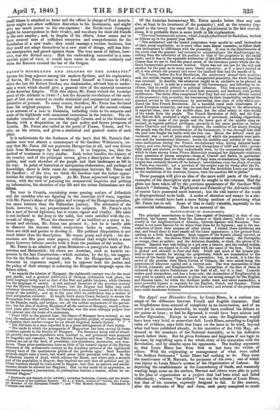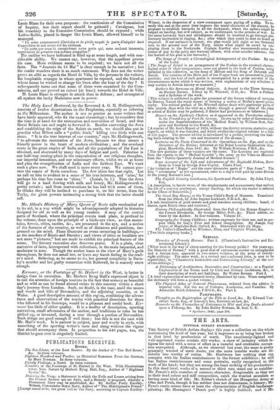The Appel aux lIonngtes Gens, by Louis Blanc, is a
curious ex- ample of the difference between French and English character. Had an Englishman been accused of complicity in an insurrection, and of an overt act in connexion therewith, he would have confined his defence to the points at issue ; or had he digressed, it would have been minute and useless digression. Except in some rare cases, the Englishman would have been very brief, or somewhat dull. Louis Blanc, according to English rules of evidence, says little that bears on the issue to be tried, beyond what had been published already, in his narrative of the 15th May, ad- dressed to the members of the National Assembly, or in his defensive speech before them. But he gives freshness and largeness if not logic to his case, by engrafting upon it the whole story of his connexion with the Revolution, and by attacks upon his opponents. The leading argument is, that Louis Blanc has from first to last been the victim of others. With the originating or management of what were called "les Ateliers Nationaux " Louis Blanc had nothing to do. They were the contrivance of M. Marrast, for purposes of his own ; one of which was injury to Louis Blanc's system of the Organization of Labour. By depriving the establishment at the Luxembourg of funds, and wantonly wasting large sums on the ateliers, Marrast and others were able to point to the plan of organization as a project that had been tried and failed ridiculously; whereas "les ateliers" was not the scheme of Louis Blanc, but that of his enemies, expressly designed to fail. In like manner, after the outbreaks of May and June, each party conspired to crush
Louis Blanc for their own purposes : the reactionists of the Commission of Inquiry, lest their report should be gainsaid ; Cavaignac, lest his treachery to the Executive Commission should be exposed ; while Ledru-Rollin, placed in danger like Louis Blanc, allowed himself to be managed.
" De cette communaute d'interets et de perils naquit le pacts d'iniquite dont Caassidiere et moi aeons ete lea victimes.
"De sorte qne ceux-]i conspirerent notre perte qui, nous sachant innocents, tremblaient de paraltre eux-memes coupables ."
The outline we have indicated is filled up at some length, and with con- siderable ability. We cannot say, however, that the appellant proves his case. More evidence seems to be required • we have not all the facts. The "Journee du 15 Mai " is clear enough in its narrative ; but the reader wonders there is so much statement. Why does not the writer prove an alibi as regards the Hotel de Ville, by the persons in the voiture, the hospitable stranger in whose apartment he reposed, and the friend at whose house he wished to change his linen after the heat of the day ? It subsequently turns out that some of these were examined by the Com- mission, and one proved an intent (at least) towards the Hotel de Ville.
M. Louis Blanc is stronger in attack than in defence ; and strongest of all against the lucky Moderates now in power.



























 Previous page
Previous page